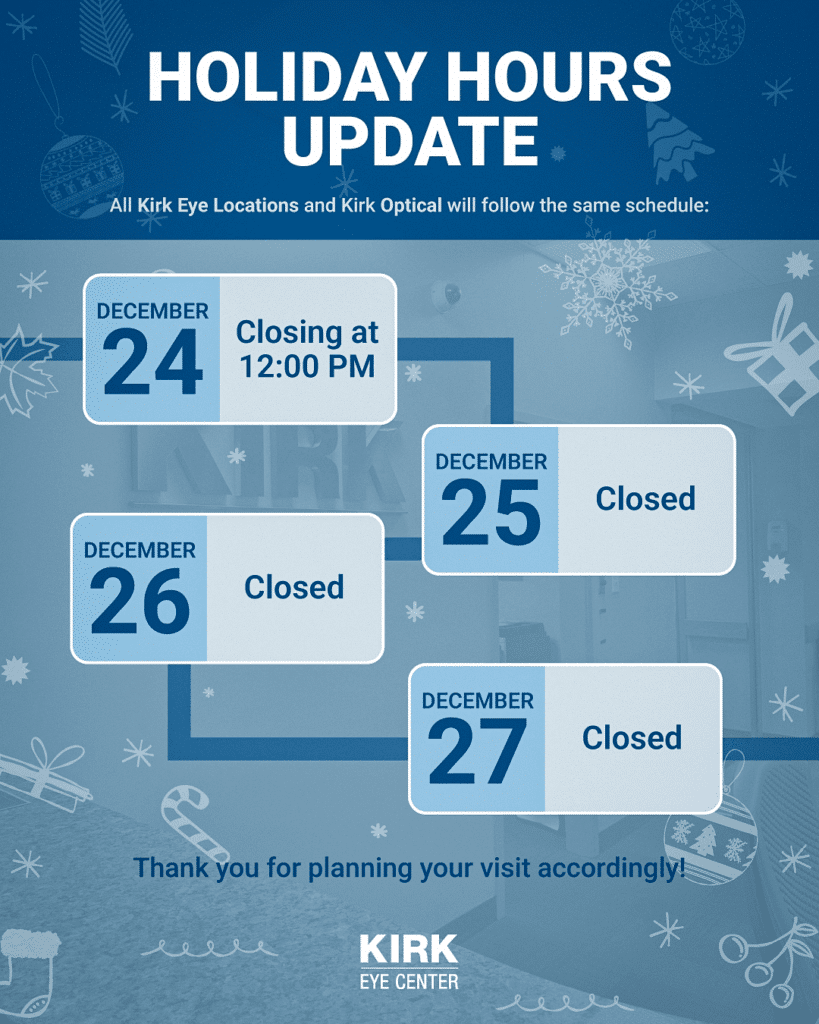
What is Diabetic Retinopathy?
Diabetic retinopathy, a serious vision condition that occurs from changes to the blood vessels in the retina, which can affect your eye’s ability to filter light into images. The high level of blood sugar in diabetic individuals can cause swelling, blocking, and fluid leakage from the retinal blood vessels. In fact, diabetic retinopathy is one of the most common causes of blindness and vision loss in individuals ages 18 – 65. Diabetic retinopathy can lead to blindness if not properly treated so it is important for diabetic patients to have annual comprehensive eye exams. The board-certified team at Kirk Eye Center offers cutting-edge vision care and treatments at all 4 of our locations.
What are the Symptoms of Diabetic Retinopathy?
You may not observe symptoms at first since the condition develops slowly over time. However, in later stages of diabetic retinopathy, symptoms may mirror those of a retinal tear or detachment. Symptoms include the following:

What Causes Diabetic Retinopathy?
Diabetic retinopathy occurs in type 1 and type 2 diabetic patients as a result of high blood sugar and blood sugar spikes. This is just one reason why it is important for individuals with diabetes to check and manage their blood sugar levels as advised by their primary care physician. Elevated blood glucose affects the retinal blood vessels, resulting in increased thickness, blockages, swelling, or fluid leakage over time. Diabetic retinopathy can cause macular edema (swelling of the macula) if left untreated, in addition to macular ischemia (blood failing to reach the macula).
How Is Diabetic Retinopathy Diagnosed?
Diabetic retinopathy is diagnosed through a comprehensive eye examination, which includes pupil dilation to allow a detailed view of the retina. This examination enables the detection of any abnormalities in the retinal blood vessels, such as swelling, blockages, or fluid leakage, which are indicative of diabetic retinopathy.
How is Diabetic Retinopathy Treated?
The vision experts at Kirk Eye Center are pleased to offer a range of treatment options for diabetic retinopathy, which will be chosen based on the stage of your condition. Corticosteroid injections or implants can be provided to reduce swelling. For leaking or damaged blood vessels, cauterizing laser procedures may be used to seal the area and prevent further damage. Patients with more advanced stages of the condition may require anti-VEGF (vascular endothelial growth factor) therapy to prevent the development of abnormal blood vessels.
Frequently Asked Questions
Treat Diabetic Retinopathy
Diabetic retinopathy could be a potential concern for anyone who has diabetes, especially if they are not taking proper care of their health. The best way for patients to avoid the disease is to control their blood sugar and have yearly eye examinations at Kirk Eye Center. Our board-certified ophthalmologists are highly trained and experienced in diagnosing and treating diabetic retinopathy so we invite you to contact our office.


